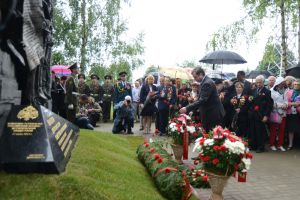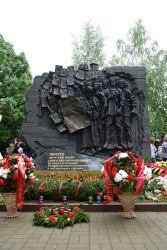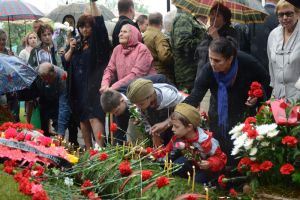A memorial to the victims of the German transit camp was opened in Vyazma

 On the eve of Memory and Grief Day a memorial to the thousands of the killed participants of the Moscow's defense was opened in Vyazma. It is set up on the site of the mass graves of the victims of the German transit camp "Dulag-184". The opening ceremony in Vyazma was attended by Minister of Culture of Russia, Chairman of the Russian Military Historical society Vladimir Medinsky, Governor Alexey Ostrovskiy, representatives of the public organizations.
On the eve of Memory and Grief Day a memorial to the thousands of the killed participants of the Moscow's defense was opened in Vyazma. It is set up on the site of the mass graves of the victims of the German transit camp "Dulag-184". The opening ceremony in Vyazma was attended by Minister of Culture of Russia, Chairman of the Russian Military Historical society Vladimir Medinsky, Governor Alexey Ostrovskiy, representatives of the public organizations.
In March of this year the Russian Military Historical society took control of the situation with the unattended graves on the territory of the former camp "Dulag-184", in response to the appeal of the public organization "Vyazma memorial". The organization, which is engaged in restoration of the memory of the victims of the German transit camp, includes relatives of the camp prisoners, searchers, World War II veterans, historians, public figures and volunteers.
 The volunteers identified the names of the four thousand killed people and found 400 families. The activists of the "Viazma memorial" for six years have been trying to commemorate the martyrs of "Dulag-184", referring to various authorities, but there was much progress. In late February of this year, the social activists sent a letter to Vladimir Medinsky. In April, the Congress of the Russian Military Historical Society, he pointed out that the problem with the memorial had been solved: the boundaries of the graves had been determined and that in June a monument was going to be set up.
The volunteers identified the names of the four thousand killed people and found 400 families. The activists of the "Viazma memorial" for six years have been trying to commemorate the martyrs of "Dulag-184", referring to various authorities, but there was much progress. In late February of this year, the social activists sent a letter to Vladimir Medinsky. In April, the Congress of the Russian Military Historical Society, he pointed out that the problem with the memorial had been solved: the boundaries of the graves had been determined and that in June a monument was going to be set up.
Vladimir Medinsky and Alexei Ostrovsky gave the right to open the monument to the veterans. Next Bishop of Smolensk and Vyazma Isidor held a memorial service for the victims, and then accompanied by the weapons salute Vladimir Medinsky, Alexey Ostrovskiy, guests from Moscow and Smolensk, residents of Vyazma laid wreaths and flowers and lit candles at the monument ...
 The author of the project of the Vyazma monument to the victims of the German transit camp is People’s Artist of Russia, one of the leading sculptors of our country Salavat Scherbakov. The monument consists of three concrete 3-4-meters-high steles. On the central stele the killed soldiers and civilians are presented in bronze. Behind them there are fir trees and a camp tower. The composition is completed with the framed photographs of people, made from the genuine photographs of the victims, given to the sculptor by the relatives and searchers. There are 50 photographs on the monument.
The author of the project of the Vyazma monument to the victims of the German transit camp is People’s Artist of Russia, one of the leading sculptors of our country Salavat Scherbakov. The monument consists of three concrete 3-4-meters-high steles. On the central stele the killed soldiers and civilians are presented in bronze. Behind them there are fir trees and a camp tower. The composition is completed with the framed photographs of people, made from the genuine photographs of the victims, given to the sculptor by the relatives and searchers. There are 50 photographs on the monument.
The casting for the monument was made in Zhukovsky, the Moscow region, the granite slab was ordered in St. Petersburg, the concrete bases were made in Smolensk. The foundation was made in Vyazma, the bronze relief was made in Moscow. The total weight of all the structural elements amounts to about 20 tons.
